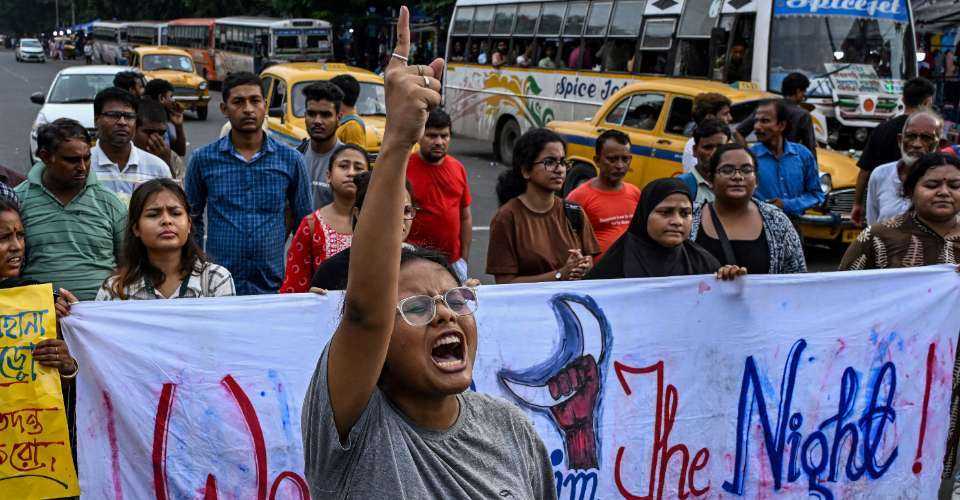
By Virginia Saldanha
The rape and horrific murder of a 31-year-old female resident doctor while on duty in a Kolkata state hospital has rightly shocked people across the country and even the world.
Many are asking why violence against women continues to repeat itself with regularity in our country. Social media is being bombarded with videos on various aspects of violence against women, as well as opinions on why it happens.
But very few say what should be done to stop it. While it is unanimous that we do not want to hear of a rape and murder of another female again, just saying so, does not stop it from happening. Therefore, what do we do?
Most point to the entrenched culture of patriarchy that is prevalent across the country, whether it be in the family, society, or even religion.
All religions promote the idea that man is the head of the family. Ephesians 5:21-29 is a reading at Sunday Mass and a suggested reading for nuptial masses. A woman is supposed to begin her marital life hearing that she must subject herself to her husband. Though it asks men to love their wives as they love themselves, that can be interpreted in many ways.
A child receives its first lessons in culture in the family. The messaging received through the attitudes and actions of parents towards each other, and the children, where males are privileged over females, reinforces the attitudes of superiority of the male.
If any form of violence is tolerated in the home, the message received is that superiority gives one power and violence can be used to enforce it. Children learn more by example than by precept.
Girls grow up to be careful to avoid any form of confrontation that could result in violence, making them timid, fearful, and pliant — a ripe victim of violence in the home and society. Her upbringing does not equip her with the strength and skills to confront or handle violence.
In cases of rape, the victim is always questioned, as to why she placed herself in a situation that made her an easy prey to rape. One of the videos circulating showed various men on the street giving their opinion of why women are being raped in the country, the response of all was that women dress provocatively. The onus is put on women to protect themselves, rather than on men to respect the bodily autonomy of a woman.
Sexual violence is frequently dismissed as a personal moral failing rather than recognized as part of a broader pattern of inequality and exploitation. This moral framing prevents a deeper understanding of the structural issues that allow such violence to persist, reinforcing existing power dynamics.
The documentary “She Said” gives us an insight into these structures of patriarchal power that enabled Harvey Weinstein to sexually abuse his women employees and get away with it. It shows how power can thwart women from reporting. Exactly what happens in the Church, including the silencing.
But the determination of a few women and men in the media made a difference and gave rise to the ‘Me Too’ movement. It also gave rise to the awareness that women in the workplace are vulnerable to violence where men are invariably the ones who wield power.
If authorities are really serious about addressing the rape culture, they should embark on an all-out campaign to raise awareness about women’s equality and the right to dress as she pleases and move around freely without the fear of being sexually assaulted.
Women have a right to be respected and parents should teach their sons from a young age to use their sexuality responsibly.
As executive secretary of the Indian bishops’ Commission for Women, I had suggested that the Church articulate a spirituality of sex in marriage, as this would elevate sexual relations between a man and a woman to the level of the sacred.
The suggestion was included in the gender policy of the bishops brought out in 2010, but nothing has been done about it to date. A spirituality of sex would also address the violence of marital rape silently suffered by many women.
Our educational institutions are another instrument of creating awareness to change attitudes towards women, of their right to equality and to live free of any form of violence.
Hundreds poured onto the streets in the major cities of the country to protest the rape and murder of the female doctor. The last time we did so was for ‘Nirbhaya,’ or fearless, a name given to a 23-year-old physiotherapy intern gang-raped and assaulted by six men on a bus in Delhi in 2012.
Apparently, the changes to the law and resolutions taken to bring about change have done nothing because numerous rapes and murders of women and young girls have taken place in the interim.
With so many powerful people involved, it remains to be seen if she will receive justice. But if each of us resolves that we will do our bit to bring about change in attitudes beginning with our homes, schools, Churches and neighborhoods, we will begin to make a difference.
source : uca news
